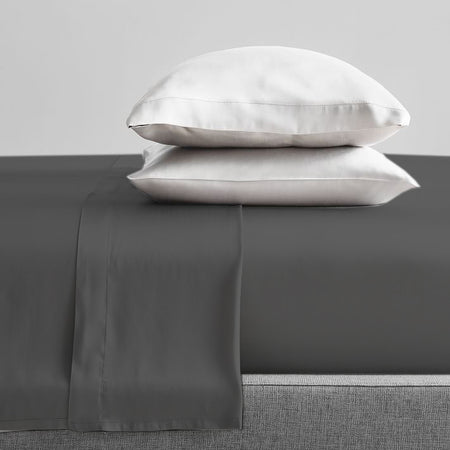What is America's bedtime? Surprisingly, that depends on which state you live in. Of course, individual bed times will vary but in general, here are the average sleep schedules for a few cities in different states.
From East to West:
New York, New York 11:54pm
Boston, Massachusetts 11:37pm
Washington, District of Columbia 11:40pm
New Orleans, Louisiana 11:46pm
Houston, Texas 11:24pm
Denver, Colorado 11:16pm
Phoenix, Arizona 11:04pm
Seattle, Washington 11:19pm
Los Angeles, California 11:31pm
Hilo, Hawaii 10:42pm

What time you fall asleep is a matter of habit. And this is just one of the many, many sleeping habits that can affect what time we fall asleep, how many hours of sleep we get and the all-important quality of our sleep. Here’s more on America’s happiest sleepers.
Who gets the most hours of sleep across the country?
This is an easy one – newborn babies. Of course, if you happen to be a very lucky parent. For the rest of us, it varies. In fact, how many hours of sleep we get is only part of the story. Average sleep per region differs. If healthy sleep is your goal, we have some helpful tips you can use to improve sleep.
Average Sleep Per Region
The Northeastern State Averages:
New York sleeps 7 hours and 5 minutes
New Jersey sleeps 6 hours and 58 minutes
Maine sleeps 7 hours and 8 minutes
Maryland sleeps 6 hours and 53 minutes
The Southeastern State Averages:
Georgia sleeps 7 hours and 9 minutes
Kentucky sleeps 7 hours and 7 minutes
Tennessee sleeps 6 hours and 55 minutes
Virginia sleeps 7 hours and 5 minutes

The Midwestern State Averages:
Indiana sleeps 6 hours and 55 minutes
North Dakota sleeps 6 hours and 52 minutes
Michigan sleeps 7 hours and 12 minutes
Ohio sleeps 6hours and 58minutes
The Western State Averages:
Hawaii sleeps 7 hours and 4 minutes
Colorado sleeps 7 hours and 8 minutes
Nevada sleeps 6 hours and 51minutes
Idaho sleeps 7 hours and 18 minutes
The Southwestern State Averages:
New Mexico sleeps 6 hours and 52 minutes
Oklahoma sleeps 7 hours and 2 minutes
Texas sleeps 6 hours and 54 minutes
New Mexico sleeps 6 hours and 52 minutes
Quick and quirky facts about how the average American sleeps at night:
Spends 7 hours and 18 minutes in bed
Goes to bed at 11:39pm
Wakes up at 7:09am
Spends 23.95 minutes snoring (at my house, we overachieve on this one).
Average sleep quality of 74.2 percent.
On a scale of 100, we rate our wake-up mood at 57 (unless it’s the start of your vacation)
Easy Sleep Hygiene Checklist
Take a moment or two to check your sleeping patterns. The older we get, the less likely it is we get as much deep sleep as we need. Becoming aware of how we sleep is the first step to getting enough healthy sleep.

- Do you have a set time to go to bed?
- What is your pre-bed time routine?
- What temperature do you keep your bedroom at night?
- How often to you wake up in the same position you fell asleep?
- Once you’re in bed, does it take over or under 20 minutes to fall asleep?
- How long would you guess you’re in deep sleep during the night?
- Are you exposed to any bright lights either before bed time or during the night?
- If you snore, might it be sleep apnea?
- How often do you take daytime naps?
- If you like to snack after dinner, how long before bed time do you stop eating?
A bit about your circadian rhythm
If you never have to travel to a different time zone, stay up past your bedtime or disrupt your sleep, you have nothing to worry about. You’re sleep cycle is solid. However, for the vast majority of us, understanding your circadian rhythm and how to normalize it can help you maximize the benefits of healthy sleep.
To many people, circadian rhythm means staying consistent with what time you go to sleep and wake up. It’s a simple as that.
However, according to scientists, there are 4 biological rhythms:
- a) circadian rhythm -- the 24 hour cycle your body follows that affects, mental, behavioral and physical health
- b) diurnal rhythm – factors which are synced with day and night within the 24 hour cycle
- c) ultradian rhythym – biological rhythms with a higher frequency than circadian
- d) infradian rhythm – biological rhythms that last longer than 24 hours.
Again, let’s keep it simple – try your best to be consistent with when you go to sleep and when you wake up no matter what time zone you’re in. If your sleep gets disrupted for some reason, try to get back to your regular routine as soon as you can. Don’t try to compensate.

Mental health and the long term effects of poor sleep
Healthy sleep and good mental health are closely related. With more and more studies we are learning just how important sleep is to our physical health and especially our psychological health. Without a doubt, sleep deprivation takes its toll even though it might be in ways you do not realize at first.
It’s truly a vicious cycle. A little bit less sleep here and there has an impact that may not be easily noticeable. At first, it might be that you’re a little more tired. This might be subtle. Just a little less sharp here and there. A little less sleep and maybe you feel a little more impatient and a little more stressed. We all have too much to do so eventually, when we first notice the effects, we might start to worry about getting everything accomplished and that can lead to a little less sleep. That’s how the cycle begins.
Doctors and scientists agree, we don’t take the quality of our sleep seriously enough. Many of us are cavalier about the amount of sleep we need for overall good health. Well, there’s an old saying about this. “You don’t know what you got till it’s gone.”
Long term, sleep deprivation can lead to or worsen a number of different disorders. Here is a partial list:
- Depression
- ADHD
- Seasonal Affective Disorder
- Schizophrenia
- Anxiety Disorder
- Bipolar Disorder
Good Sleeping Habits Improve Sleep
Over the years we might pick up a bad habit here and there. Maybe it’s just one thing. Maybe it’s a bunch of little things you haven’t even noticed. Either way, over time they can add up. Together they can get you dangerously close to sleep deprivation. The good news is you can change it. Spend some time looking over the tips we’ve prepared. Pick out a few favorites and try them out. Have fun with them and then add a few more until you’re sleeping like a baby.

Some Annoying But Important Tips:
- Limit your alcohol intake especially within 4 hours of your bedtime
- Reduce or even better, eliminate after dinner snacking (When those darn pizza commercials come on late at night – I try covering my eyes and ears)
- Eat a well-balanced dinner. (That big steak might sound good in the moment, but it can turn into a meat bomb in the middle of the night.)
- Limit your intake of water or other drinks after dinner.
- Exercise regularly (Sleeping in late when you could be exercising doesn’t count)
Some Easy Tips:
- Install room darkening shades.
- Program or adjust your thermostat to less than 67 degrees at night time
- Don’t watch the late news before you go to bed. If you must, then watch an episode or two of I LOVE LUCY to cleanse your mental palate
- Brush your teeth, get into your pajamas and turn down your bed well before your bed time so you can slide right in when you get sleepy later.
- Lay out what you’re going to wear the next day so you don’t have to stress in the morning.
Some Fun Tips
- Go bed shopping. -- You’re definitely missing out If it’s been more than two years since you bought a new mattress. There has been so much innovation in the type, the technology and the quality of mattresses. The options available now are beyond your imagination. There’s no such thing as the good old days when it comes to mattresses.
- Does your bed wink at you when you go by? – I know this sounds silly, but if you’re not thinking to yourself, “Gosh darn I love my bed!” It’s time to get that new mattress and especially all the wonderful duvets, sheets, pillows and other accessories available today. The better your bed looks, the more you’ll want to get in and stay in.
- Get a sleep app on your phone. They can track how many hours you sleep, the quality of your sleep, how many times you wake up and whether not you snore. (Maybe experiment with the snoring function on your partner first.)
- Count sheep – it really works. Meditating is hard. Counting sheep is easy. If sheep aren’t your thing, imagine a mental picture of your perfect vacation. Imagine what each and every thing looks like, what it sounds like and how much fun it’s going to be laying in that hammock on the beach.
- Make a gift list. That’s right, if money were no object, what gift would you give everyone you love. And what would you give yourself – a bed maybe???






















